Related Research Articles

Bodyline, also known as fast leg theory bowling, was a cricketing tactic devised by the English cricket team for their 1932–33 Ashes tour of Australia. It was designed to combat the extraordinary batting skill of Australia's leading batsman, Don Bradman. A bodyline delivery was one in which the cricket ball was bowled, at pace, at the body of the batsman in the expectation that when he defended himself with his bat, a resulting deflection could be caught by one of several fielders standing close by on the leg side.
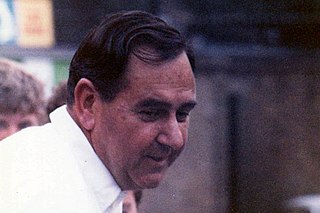
Michael Colin Cowdrey, Baron Cowdrey of Tonbridge, was an English cricketer who played for Kent County Cricket Club from 1950 to 1976, and in 114 Test matches for England from 1954 to 1975. He was born in Ootacamund, Madras Presidency, British India and died in Littlehampton, West Sussex.
John Augustine Snow is a retired English international cricketer who played for Sussex from 1961 to 1977 and represented England in 49 Test matches. He was born in Peopleton, Worcestershire.
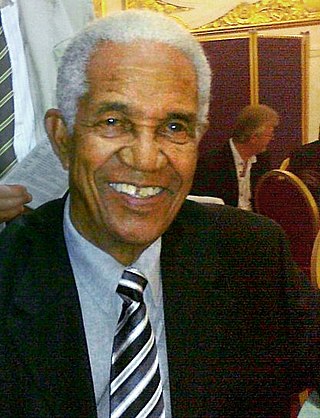
Sir Garfield St Aubrun Sobers,, also known as Sir Gary or Sir Garry Sobers, is a former cricketer who played for the West Indies between 1954 and 1974. A highly skilled bowler, an aggressive batsman and an excellent fielder, he is widely considered to be cricket's greatest ever all-rounder and one of the greatest cricketers of all time.

William Joseph O'Reilly OBE was an Australian cricketer, rated as one of the greatest bowlers in the history of the game. Following his retirement from playing, he became a well-respected cricket writer and broadcaster.

William Maldon Woodfull was an Australian cricketer of the 1920s and 1930s. He captained both Victoria and Australia, and was best known for his dignified and moral conduct during the tumultuous bodyline series in 1932–33. Trained as a schoolteacher, Woodfull was known for his benevolent attitude towards his players, and his patience and defensive technique as an opening batsman. Woodfull was not a flamboyant player, but was known for his calm, unruffled style and his reliability in difficult situations. His opening pairing with fellow Victorian Bill Ponsford for both his state and Australia remains one of the most successful in history. While not known for his tactical skills, Woodfull was widely admired by his players and observers for his sportsmanship and ability to mould a successful and loyal team through the strength of his character.
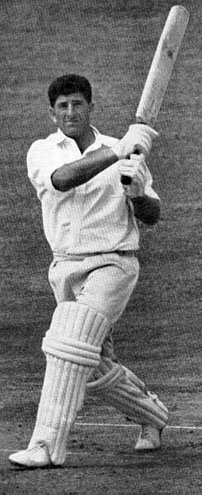
Kenneth Frank Barrington, was an English international cricketer who played for the England cricket team and Surrey County Cricket Club in the 1950s and 1960s. He was a right-handed batsman and occasional leg-spin bowler, known for his jovial good humour and long, defensive innings "batting with bulldog determination and awesome concentration".

Warwick Windridge Armstrong was an Australian cricketer who played 50 Test matches between 1902 and 1921. An all-rounder, he captained Australia in ten Test matches between 1920 and 1921, and was undefeated, winning eight Tests and drawing two. Armstrong was captain of the 1920–21 Australian team which defeated the touring English 5–0: one of only three teams to win an Ashes series in a whitewash. In a Test career interrupted by the First World War, he scored 2,863 runs at an average of 38.68, including six centuries, and took 87 wickets. He was inducted into the Australian Cricket Hall of Fame in 2000.

Robert Baddeley Simpson is a former cricketer who played for New South Wales, Western Australia and Australia, captaining the national team from 1963/64 until 1967/68, and again in 1977–78. He later had a highly successful term as the coach of the Australian team. He is also known as Bobby or Simmo.

Brian Charles Booth was an Australian cricketer who played in 29 Test matches between 1961 and 1966, and 93 first-class matches for New South Wales. He captained Australia for two Tests during the 1965–66 Ashes series while regular captain Bob Simpson was absent due to illness and injury. Booth was a graceful right-handed middle order batsman at No. 4 or 5, and occasionally bowled right arm medium pace or off spin. He had an inclination to use his feet to charge spin bowlers. Booth was known for his sportsmanship on the field and often invoked Christianity while discussing ethics and sport.
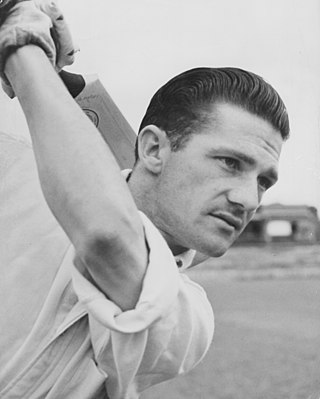
Robert Neil Harvey is an Australian former cricketer who was a member of the Australian cricket team between 1948 and 1963, playing in 79 Test matches. He was the vice-captain of the team from 1957 until his retirement. An attacking left-handed batsman, sharp fielder and occasional off-spin bowler, Harvey was the senior batsman in the Australian team for much of the 1950s and was regarded by Wisden as the finest fielder of his era. Upon his retirement, Harvey was the second-most prolific Test run-scorer and century-maker for Australia.
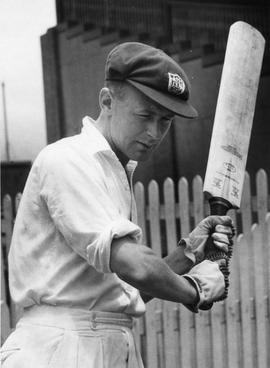
Arthur Robert Morris was an Australian cricketer who played 46 Test matches between 1946 and 1955. An opener, Morris is regarded as one of Australia's greatest left-handed batsmen. He is best known for his key role in Don Bradman's Invincibles side, which made an undefeated tour of England in 1948. He was the leading scorer in the Tests on the tour, with three centuries. His efforts in the Fourth Test at Headingley helped Australia to reach a world record victory target of 404 on the final day. Morris was named in the Australian Cricket Board's Team of the Century in 2000 and was inducted into the Australian Cricket Hall of Fame in 2001.

Alan Keith Davidson was an Australian cricketer of the 1950s and 1960s. He was an all rounder: a hard-hitting lower-order left-handed batsman, and an outstanding left-arm fast-medium opening bowler. Strongly built and standing six feet tall, Davidson was known for his hard hitting power, which yielded many long hit sixes.
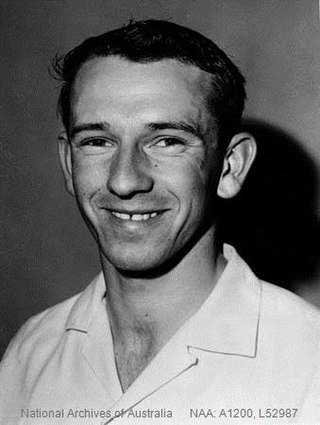
Kevin Douglas Walters is a former Australian cricketer. He was known as an attacking batsman, a useful part-time bowler, and also as a typical ocker.
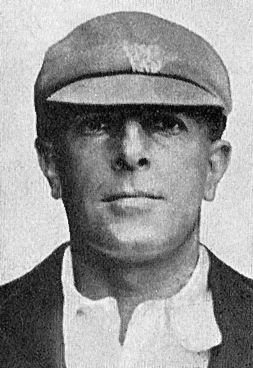
Charles George Macartney was an Australian cricketer who played in 35 Test matches between 1907 and 1926. He was known as "The Governor-General" in reference to his authoritative batting style and his flamboyant strokeplay, which drew comparisons with his close friend and role model Victor Trumper, regarded as one of the most elegant batsmen in cricketing history. Sir Donald Bradman—generally regarded as the greatest batsman in history—cited Macartney's dynamic batting as an inspiration in his cricket career.
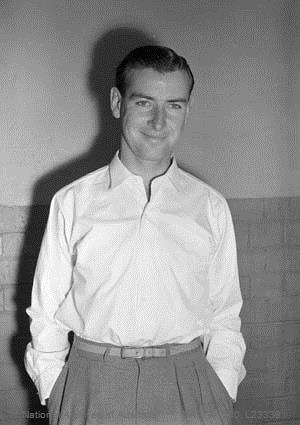
Ian Meckiff is a former cricketer who represented Australia in 18 Test matches between 1957 and 1963. A left-arm fast bowler, he is best known for two matters that were unrelated to his skill as a player: he was the batsman run out by Joe Solomon in 1960, causing the first Tied Test in cricket history; and in December 1963, his career was sensationally ended when he was called for throwing in the First Test against South Africa by Australian umpire Col Egar. During the late 1950s and early 1960s, there had been a media frenzy about the perceived prevalence of illegal bowling actions in world cricket. The controversy and speculation that dogged Meckiff in the years preceding his final match caused sections of the cricket community to believe that he had been made a scapegoat by the Australian cricket authorities to prove their intent to stamp out throwing.
Colin John "Col" Egar was an Australian Test cricket umpire.
Duncan Albert Sharpe is a Pakistani former cricketer who played in three Test matches in 1959–60. Sharpe is of Anglo-Indian heritage, and was the third Christian to play Test cricket for Pakistan.
M.J.K. Smith captained the English cricket team in Australia in 1965–66, playing as England in the 1965-66 Ashes series against the Australians and as the MCC in their other matches on the tour. The 5-Tests series ended in 1–1 draw. Although they failed to reclaim the Ashes this was not unexpected as the Australian press labelled them the weakest MCC team to arrive in Australia and the bookmakers were giving odds of 7/2 on their winning the series. These views rapidly changed as they set about winning their state matches with exciting, aggressive cricket and by the First Test the odds against them had been reduced to evens. Lindsay Hassett said "other teams from England may have been better technically but none had tried so hard to make the game as interesting as possible". Financially the tour's receipts were much lower than in 1962–63 due to the number of rain-affected games in a wet Australian summer and the general doldrums of the sixties.

The 1965–66 Ashes series consisted of five cricket Test matches, each of five days with six hours play and eight ball overs. It formed part of the MCC tour of Australia in 1965–66 and the matches outside the Tests were played in the name of the Marylebone Cricket Club. M.J.K. Smith led the England team with the intent on regaining the Ashes lost in the 1958–59 Ashes series, but the series was drawn 1-1 and they were retained by Australia. The Australian team was captained by Bobby Simpson in three Tests, and his vice-captain Brian Booth in two Tests.